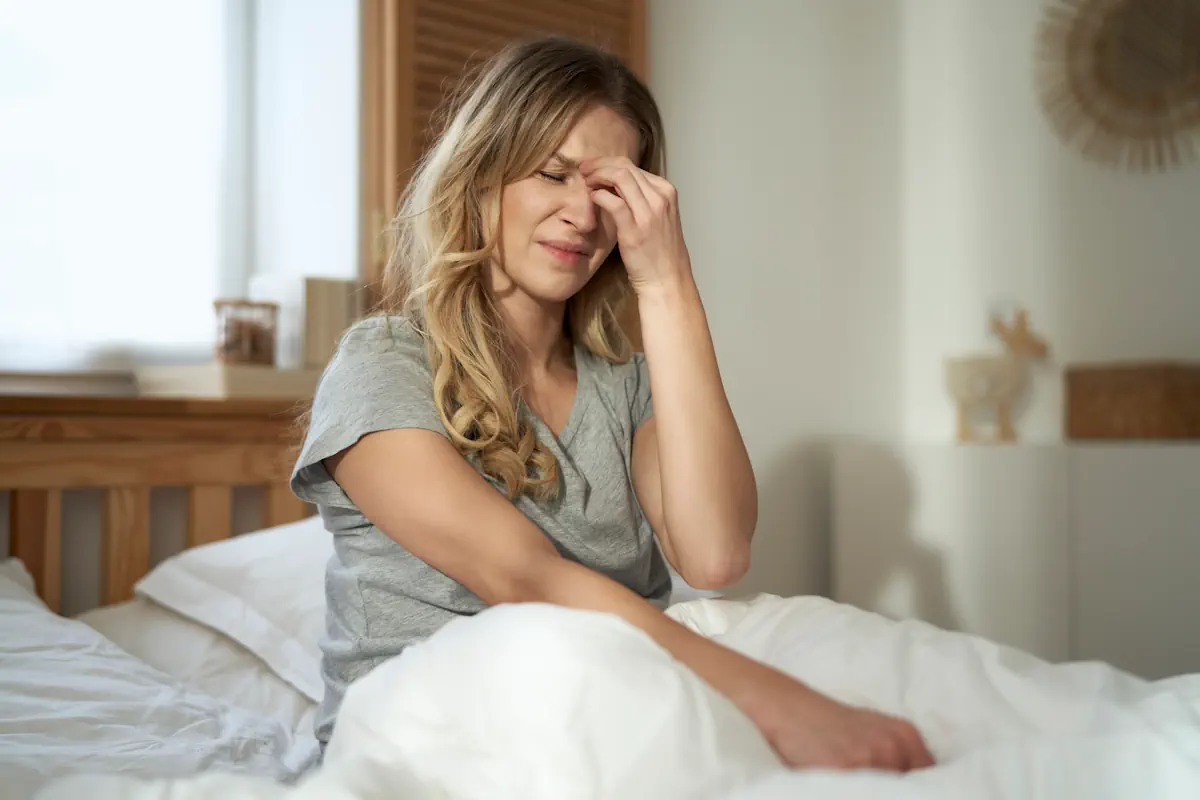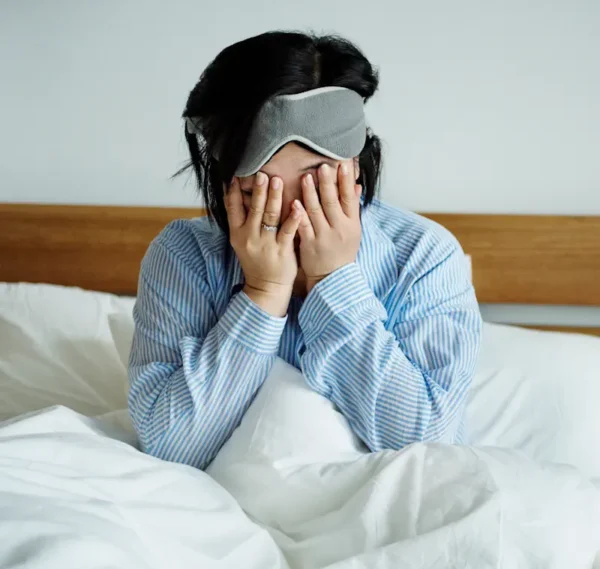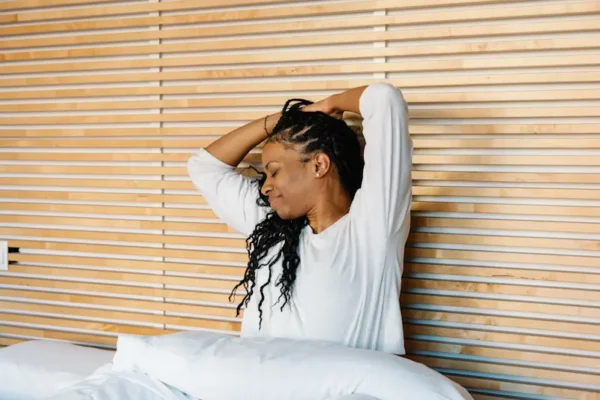Perimenopause Sleep Issues: Why Can’t I Sleep Anymore?
By Ashley Nowe
Published:

It’s 3 a.m. and you’re wide awake, tossing and turning, anxiously spiraling about how you’re not sleeping.
Again.
“I’m so hot!” you shout, tossing the covers aside from your sweaty body.
Again.
Now you need to get up to pee.
Again.
Why is sleeping suddenly so… hard?
If you’re in your 40s or 50s, odds are it has something to do with your hormone levels. Poor sleep and sleep disturbances due to hormonal fluctuations are yet another (frustrating) symptom of perimenopause. Let’s dive into perimenopause sleep issues and 10 changes you can make to get better sleep!
Sleep During Menopause: How Sleep Changes
Trouble sleeping and poor sleep quality can have a big impact on other areas of your life. (If you’ve experienced newborns or toddlers, you recall the exhaustion and brain fog that came from the lack of sleep.)
It’s rough.
As perimenopause hits, estrogen and progesterone levels drop. Many women – studies show about 50%, according to the NIH’s SWAN study – begin to experience sleepless nights, night sweats, daytime brain fog, and more.
Other Common Menopausal Sleep Problems

While changing hormones during perimenopause have a lot to do with sleep disruption, other things can impact sleep:
Hot flashes and sleep (also known as night sweats)
Hot flashes (or hot flush) are one of the most well-known symptoms of the menopause transition, and they can occur at any time, day or night. Research shows that women tend to wake up at night just before a hot flash occurs, which can really throw off precious sleep.
Sleep apnea
Thanks to the decline of reproductive hormones like estrogen and progesterone, some people develop sleep disorders, such as sleep apnea. These often go undiagnosed because women may mix these symptoms up with perimenopause symptoms.
Find out why sleep apnea is more common for women over the age of 55 in our interview with Dr. Brittany Penberthy.
Find out how sleep apnea literally saves our lives and how it can lead to feelings of insomnia in this additional clip with Dr. Brittany Penberthy.
Mental health/mood disorders
Anxiety and depression can also impact sleep quality. We highly encourage women to talk with a mental health professional or your physician about mental health concerns.
Overactive mind
The SWAN study also suggests our brains become more active during sleep at this time, leading to lighter and poorer quality sleep.
Seasonal changes
Perimenopausal women often report having more trouble sleeping in the summer, when they have more hot flashes and night sweats.
Remember: perimenopause sleep issues won’t last forever.
Improve Sleep Quality: 10 Tips for a Good Night’s Rest During Perimenopause

Most people need at least 7 – 8 hours of quality sleep each night. For some, the issue might be getting to sleep, for many others, the challenge is how to stay asleep or fall asleep after waking.
Here are a few tried and true tips that will hopefully help you get to sleep and STAY asleep during perimenopause and beyond:
1. Keep a regular sleep schedule and bedtime routine:
Prioritize sleep by going to bed and waking at the same time every day. We thrive on routine. Following the same evening ritual will cue your brain and body that it’s time to wind down and get to sleep.
2. Avoid late naps:
Naps are awesome. But if you snooze too late in the afternoon or early evening, you may struggle to sleep at night.
3. Get regular exercise:
Those who exercise regularly tend to have more restful and restorative sleep. Try not to exercise too close to bedtime though, since it raises body temperature and heart rate, and that can lower sleep quality.
4. Slow yoga flow:
Reset your nervous system with slow, calming movement designed to promote relaxation and sleep. This is the one exception to the “don’t work out too close to bedtime” rule. (Check out some of our slow yoga flows on our Menovation.)
5. Turn down the temp:
Lower your thermostat overnight (studies suggest the ideal sleeping temperature is 60 – 67 degrees) and/or turn on a fan to keep air moving. Keep a glass of cold/ice water by your bedside to sip on overnight if you wake up hot.
6. Remake your bed:
Try using sheets and bedding made from naturally cooling materials, like cotton percale or linen. Some synthetic textiles, like Tencel, have cooling technology built into the fabric.
7. Turn off the screen:
By now, you probably know that the light from phones, iPads, TV screens, etc., can make it difficult for your brain to know when it’s time to start producing melatonin, which induces sleep. Staying off screens for the hour or more before bed allows your brain to wind down.
8. Avoid food and beverage triggers:
Alcohol, caffeine, and spicy foods are known to trigger hot flashes. They are also known sleep disruptors. Try to avoid these in the hours before bedtime.
9. Magnesium and other supplements:
Magnesium, specifically magnesium glycinate, may improve sleep because it helps to relax the nervous system and muscles. Magnesium-rich whole foods include nuts, leafy greens, whole grains, and soy products. There are many magnesium supplements available, so make sure to do your research and always check with your doctor about adding supplements to your routine to avoid potential drug interactions. The jury is still out on whether some herbs and supplements are safe.
Here’s a link to my favorite Magnesium supplement. Use code ASHLEYNOWE to save 10%! (link HERE)
10. Hormone replacement therapy (HRT):
According to the NIH, hormone therapy steadies the levels of estrogen and progesterone in the body. This treatment effectively alleviates hot flashes and helps with vaginal dryness, sleep, and maintaining bone density. There are risks, too, so please talk with your provider to discuss if you are a good candidate for HRT.
Keep in mind that over the counter sleep aids (i.e. melatonin) and prescription medication are ok to use occasionally, but are not good long term solutions. They can’t cure insomnia.
Sleepless nights and perimenopause sleep issues may be a common experience among perimenopausal women but rest assured (see what we did there?) that it won’t last forever. Most post-menopausal women share that their sleep quality improves and goes back to pre-menopausal norms.
How Menovation Can Help Women’s Health
In the meantime, we are here at Menovation to help support and empower you through your perimenopause sleep issues and beyond. It features exercises, nutrition plans, and education for improved well-being, reduced symptoms, and inspiring self-care for confidence and vitality. Then tell a friend – we are trying to keep the lines of communication about peri(menopause) open, right?
As always, talk to a doctor or mental health professional about your experience. Be sure to reach out to a professional for additional support, especially if you are experiencing severe symptoms, want to explore hormone therapy, or have other health concerns.
Take the “What stage am I in?” quiz here to find out what stage of perimenopause or menopause you are in and receive a free guide to help you feel your best during that time!
Ready to feel stronger through perimenopause? The Menovation app is your go-to hub for perimenopause fitness, health tips, and support. Available now in the App Store and Google Play. Start free trial here.
